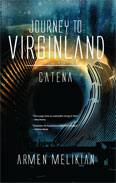"If I have committed errors or faltered, it is due to my human foibles... I don't exist here."

 |
Journey to Virginland: Catena by Armen Melikian Trafford Publishing
book review by Cynthia Collins
The main character, a man named Dog, is not comfortable with his life and sets out to learn about the world apart from his own. He lives in Dreamland which is made up of such places as Leninland, Satanland, Paradise, and others. During his wandering, he encounters differing opinions in all subjects ranging from treatment of women, sex, religion, and politics, to language, accents, physical appearance, and the kind of car one owns. By the end of his journey, he has discovered a lot about himself—what type of individual he is, and isn't.
This is a satire on many levels. Dog's world is shown on a map with the locations labeled. Satanland is the equivalent of the USA, Leninland is Russia, Socratesland is Greece, and other names that call attention to the preconceptions of certain parts of the world. How these preconceived notions play out is both subtle and obvious. And there is humor, which is the core of satire. The scenes are both striking and at times humorous. In fact, the story seems to shatter perception and deliver a certain clarity which in itself is an x-ray, so to speak, of hypocrisy.
Readers will have some idea what to expect if they have read George Orwell's 1984, written as a protest against Stalin and totalitarianism. The news reports that must be edited to comply with Big Brother's version, the false reports issued to glorify the standard of living, and the assumption that anyone who disagrees with the Party is a dissident have similar story lines in Melikian's work. One example is in Dog's explanation of the names of various countries within Dreamland: "A country was created... and christened Virginland, with Papa Lenin according the name his thumbs-up. Papa Lenin took exception to the names Paradise and Godland." This relates to the long-standing atheistic view of the Communist Party.
The extremes continue with other subjects, such as women. They either can't do anything that would be thought of as alluring or they are considered easy. Men, on the other hand, can do whatever they want. Regarding the sex scenes, the language is blunt and graphic. Along this same vein are scenes relating to scandals of sleeping with the boss to get a job, and church scandals involving money and sex. The author satirizes religion itself when discussing whether interpretive practices and writings are literal or figurative. With each page, more of the story points to problems and events that are happening in the world today. In short, this book questions everything and does it in a well-educated way that keeps one's attention. The pages are filled with names found in mythology, history, and religion, and occasionally contain Latin text.
Melikian's story is reminiscent of The Man Without a Country by Edward Everett Hale, in which an American Army officer is sentenced to spend the rest of his life at sea. Dog is not forced to take his journey, but it is this roaming, this wanderlust, searching for meaning of his own life and the world around him, and coming to terms with what he has discovered, that make this an interesting and intellectual book.
RECOMMENDED by the US Review